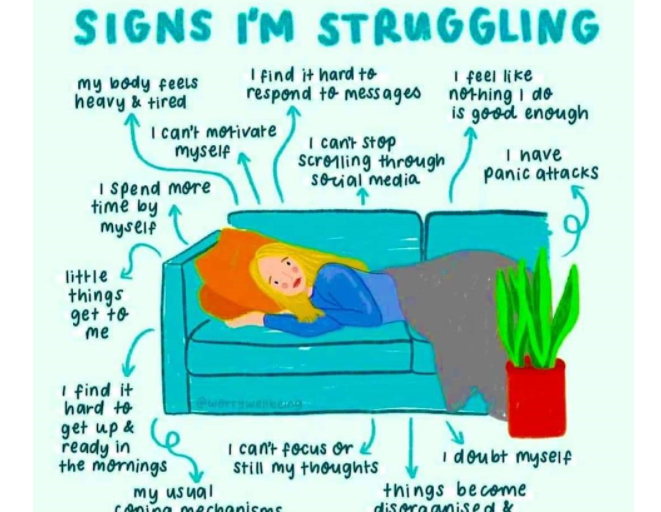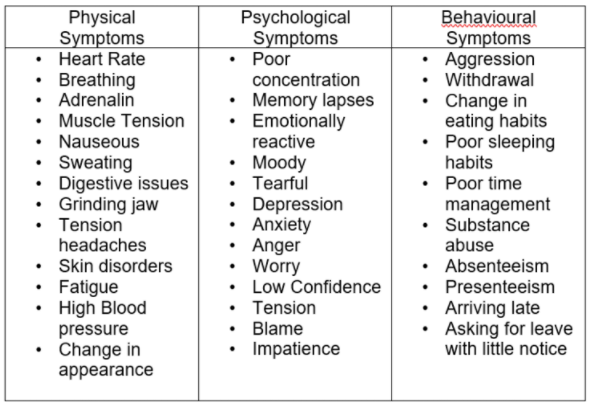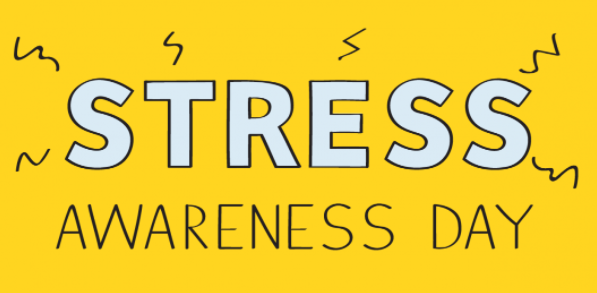Welcome to November – the 3rd of November is Stress Awareness day. What is stress? Very simply it’s the body’s response to feeling threatened or under pressure, overwhelmed and unable to cope with mental and emotional pressure. It is common, but it is important to remember that the symptoms can be debilitating over a prolonged period.
The Health and Safety Executive (HSE) looks at work-based stress, defining stress as “The adverse reaction people have to excessive pressures, or other types of demand placed on them.” A common feature of stress in the workplace for example is when employees feel unable to cope with pressures and deadlines placed on them.
HSE focuses on six key areas which can affect stress levels:
- Demands
- Control
- Support
- Relationships
- Role
- Change
Some of the signs and symptoms of stress particularly prolonged and acute/chronic stress are:
Depression, anxiety, irritability, poor memory and concentration, mood swings, low sex drive, interrupted sleep patterns. All of these can result in what’s commonly termed “burn out”.

What can cause stress?
Big life events like moving house, divorce, bereavement, health issues, unrealistic demands at work including a negative working environment. However it’s often more of the impact of cumulative less significant events over time that can overwhelm us.
Stress affects us in different ways, some people can cope with stressful situations in their stride while others will be crushed by it. The difference can be attitude and approach to stress, historical factors in earlier life that may have reduced our resilience to stressors, other things going on in our life at the same time, how much choice we perceive we have over situations and our support network. It is important to understand why we react the way we do and looking at a more balanced approach that supports us in cushioning ourselves against stressful situations. Understanding our stress signature is vital.
What is my stress signature?
The first step in managing our response is to recognise our stress response. Stress is the physical, psychological & behavioural response to situations, people or events when the perceived demands of a situation outweigh our perceived coping ability.
That word – “perceived” is very important in this definition. No two people will view a stressor in exactly the same way. What causes me stress, may be a walk in the park to you and vice versa. It is also important to recognise that stress can involve an element of “self-fulfilling prophecy”. If I believe that I don’t have the skills/resilience to manage a stressor then I probably won’t. If I do believe I have the skills to manage a stressor or challenge that I am facing – then I probably will cope and even thrive.
The first step is to recognise my stress signature. What starts to happen to me physically and psychologically and what am I doing differently (behaviour) that demonstrates that my stress is getting on top of me? Look at the list of symptoms and identity what’s relevant to you.
It is probably likely that your partner, children, close friends or work colleagues know your stress signature even better than you do. They might recognise that you are withdrawn, or get in a bad mood, or have a short fuse or you may be tearful.

Responding to stress
Often, we tend to turn to things that are unhelpful to us to help us cope for example alcohol or smoking. We may feel these give some light relief in the short term but long term it is damaging to our health and wellbeing. Not taking control of our situation and doing nothing will only make matters worse.
So how do we help tackle stress? Well in the workplace the sooner it is identified the sooner support can be put in place which will hopefully prevent a period of sickness. Depending on the support someone receives will depend on the outcome for the individual.
In work we can’t change the organisation however we can change our approach to the organisation, by taking positive control and looking at what we need to maintain a balanced well-being.
Taking control of the situation can be really empowering, and it isn’t the big changes we make, it’s the small things we tweak that make the biggest difference. Some of these changes can be:
Being active (exercise) in whatever way feels right for you can really support your wellbeing and cushion you against stress. It doesn’t irradicate it but it does give your mind and body the endorphins that feeds positive feelings in the brain.
Connecting with people and creating a positive support network can help you see things from a different perspective.
“Me time” Very important to create time for yourself to do whatever you want just for you. It’s also important to build this into your week otherwise it loses its importance. It may feel counter-intuitive to plan in down time when you are feeling stressed and over-worked, but this is when you need healthy activities more.
Avoid unhealthy habits this can be hard when we are feeling really stressed, however excessive alcohol and poor diet makes us feel tired and lethargic which only adds to those feelings of unable to cope.
It’s important to recognise the differences between good stress, and stress that is harmful.
Good stress can be short term and it motivates and inspires us, keeping us focused and performing well towards a specific goal. Bad stress however is the kind that exhausts us, leaving us on edge, constantly worrying and is harmful to our health. It’s important to recognise when it stops being good stress and starts becoming negative, prolonged stress.
For people in management positions, it’s important to be able to recognise when an employee is experiencing stress, and in responding to that, being able to look at the situation from a balanced perspective. Hopefully one that encourages a balance between work and personal life.
Take time to talk and reflect on what’s going on for you now. That may be talking to your partner, a family member, close friend. If you don’t feel able to open up to those close to you (perhaps as you don’t want to worry anyone), therapy can be beneficial. It offers a safe space to reflect on why you are experiencing stress, look at positive ways to reduce and manage it, utilising practical strategies and techniques to cushion yourself. It also can help build resilience and awareness so you can recognise the signs much earlier therefore protecting yourself against high levels of stress.
If you are worried about a colleague, remind them about help that may be freely accessible such as an Employee Assistance Helpline, support through private healthcare, HR or occupational health teams. You may have a mental health first aider too in your organisation that has chosen to have special training on how to help people with difficulties.
If you or someone you know is at immediate risk, you can call 999 or attend A&E for an urgent assessment. Supporting someone who is suicidal is hard for you. Rethink has great advice on this. Suicidal thoughts – How to support someone (rethink.org)
Helpful links
Mental health awareness days – Mental Health UK (mentalhealth-uk.org)
NATIONAL STRESS AWARENESS DAY – November 3, 2021 – National Today
Just for men contact C.A.L.M Tel: 0800 585858, webchat and online: thecalmzone.net
Man MOT | Men’s Health Forum (menshealthforum.org.uk)
We have a helpful section on our website about what to do if you/someone else is feeling stressed or mentally unwell Frequently Asked Questions – The Wellness Consultancy.
Andrea Whittaker-Ward and Rachel Wesley
The Wellness Consultancy

